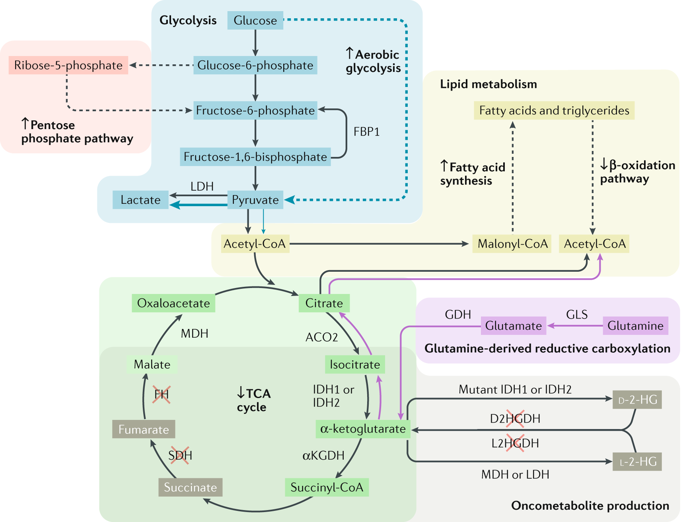当前位置:
X-MOL 学术
›
Nat. Rev. Nephrol.
›
论文详情
Our official English website, www.x-mol.net, welcomes your
feedback! (Note: you will need to create a separate account there.)
Oncometabolites in renal cancer.
Nature Reviews Nephrology ( IF 28.6 ) Pub Date : 2019-10-21 , DOI: 10.1038/s41581-019-0210-z Cissy Yong 1, 2 , Grant D Stewart 1, 2 , Christian Frezza 3
Nature Reviews Nephrology ( IF 28.6 ) Pub Date : 2019-10-21 , DOI: 10.1038/s41581-019-0210-z Cissy Yong 1, 2 , Grant D Stewart 1, 2 , Christian Frezza 3
Affiliation

|
The study of cancer metabolism has evolved vastly beyond the remit of tumour proliferation and survival with the identification of the role of 'oncometabolites' in tumorigenesis. Simply defined, oncometabolites are conventional metabolites that, when aberrantly accumulated, have pro-oncogenic functions. Their discovery has led researchers to revisit the Warburg hypothesis, first postulated in the 1950s, of aberrant metabolism as an aetiological determinant of cancer. As such, the identification of oncometabolites and their utilization in diagnostics and prognostics, as novel therapeutic targets and as biomarkers of disease, are areas of considerable interest in oncology. To date, fumarate, succinate, L-2-hydroxyglutarate (L-2-HG) and D-2-hydroxyglutarate (D-2-HG) have been characterized as bona fide oncometabolites. Extensive metabolic reprogramming occurs during tumour initiation and progression in renal cell carcinoma (RCC) and three oncometabolites - fumarate, succinate and L-2-HG - have been implicated in this disease process. All of these oncometabolites inhibit a superfamily of enzymes known as α-ketoglutarate-dependent dioxygenases, leading to epigenetic dysregulation and induction of pseudohypoxic phenotypes, and also have specific pro-oncogenic capabilities. Oncometabolites could potentially be exploited for the development of novel targeted therapies and as biomarkers of disease.
中文翻译:

肾癌中的肿瘤代谢物。
随着“肿瘤代谢物”在肿瘤发生中的作用的确定,癌症代谢的研究已经远远超出了肿瘤增殖和存活的范围。简单地定义,致癌代谢物是常规代谢物,当异常积累时,具有促癌功能。他们的发现促使研究人员重新审视 20 世纪 50 年代首次提出的 Warburg 假说,即代谢异常是癌症的病因决定因素。因此,肿瘤代谢物的鉴定及其在诊断和预后中的应用,作为新的治疗靶点和疾病的生物标志物,是肿瘤学领域备受关注的领域。迄今为止,富马酸、琥珀酸、L-2-羟基戊二酸 (L-2-HG) 和 D-2-羟基戊二酸 (D-2-HG) 已被定性为真正的肿瘤代谢物。肾细胞癌 (RCC) 的肿瘤发生和进展过程中会发生广泛的代谢重编程,并且三种致癌代谢物 - 富马酸盐、琥珀酸盐和 L-2-HG - 与该疾病过程有关。所有这些致癌代谢物都会抑制称为α-酮戊二酸依赖性双加氧酶的酶超家族,导致表观遗传失调和假性缺氧表型的诱导,并且还具有特定的促癌能力。肿瘤代谢物有可能被用于开发新型靶向疗法并作为疾病的生物标志物。
更新日期:2019-10-22
中文翻译:

肾癌中的肿瘤代谢物。
随着“肿瘤代谢物”在肿瘤发生中的作用的确定,癌症代谢的研究已经远远超出了肿瘤增殖和存活的范围。简单地定义,致癌代谢物是常规代谢物,当异常积累时,具有促癌功能。他们的发现促使研究人员重新审视 20 世纪 50 年代首次提出的 Warburg 假说,即代谢异常是癌症的病因决定因素。因此,肿瘤代谢物的鉴定及其在诊断和预后中的应用,作为新的治疗靶点和疾病的生物标志物,是肿瘤学领域备受关注的领域。迄今为止,富马酸、琥珀酸、L-2-羟基戊二酸 (L-2-HG) 和 D-2-羟基戊二酸 (D-2-HG) 已被定性为真正的肿瘤代谢物。肾细胞癌 (RCC) 的肿瘤发生和进展过程中会发生广泛的代谢重编程,并且三种致癌代谢物 - 富马酸盐、琥珀酸盐和 L-2-HG - 与该疾病过程有关。所有这些致癌代谢物都会抑制称为α-酮戊二酸依赖性双加氧酶的酶超家族,导致表观遗传失调和假性缺氧表型的诱导,并且还具有特定的促癌能力。肿瘤代谢物有可能被用于开发新型靶向疗法并作为疾病的生物标志物。











































 京公网安备 11010802027423号
京公网安备 11010802027423号